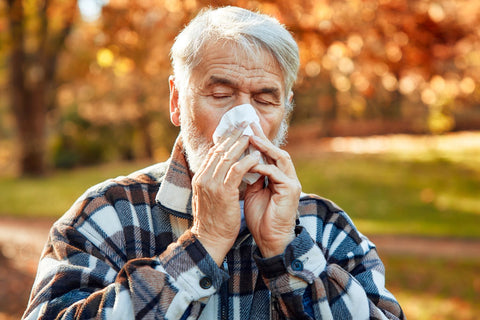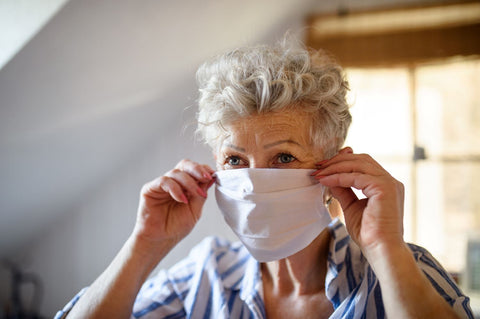Seasonal allergies, also known as hay fever, are allergic reactions that happen during specific times of the year, such as in spring or autumn. These allergies might occur due to airborne pollen from trees, weeds, and grasses. During spring and autumn, pollen production increases, causing allergic reactions when the pollen settles on a person's skin, in their nose, or lungs. Seasonal allergies in later years cause significant risks as our immune system weakens with age.
As we look forward to spring and warmer weather, it's important to help our elderly loved ones deal with the unpleasant effects of allergies. In this blog, we will discuss ways to help our older family members prepare for allergy season, ensuring they have a comfortable and sneeze-free springtime.
Do seasonal allergies get worse with age?
Allergy season can be challenging for everybody, especially for older adults. Our immune system weakens as we age, making us more sensitive to allergies and symptoms in later years. Seasonal allergies can aggravate other long-term medical conditions like joint pain, respiratory diseases, or cardiovascular diseases.
Moreover, older adults might find it difficult to deal with the discomfort of runny noses and itchy eyes if they already have limited energy or difficulty sleeping at night. Identifying symptoms and consulting with a GP can help avoid severe health complications in older adults due to seasonal allergies.
Signs of seasonal allergies in older adults

The symptoms of seasonal allergies may differ for everyone, and sometimes, loved ones can overlook these symptoms, especially when they return every year. However, the effects of seasonal allergies can be severe, so it's important to pay attention to these symptoms. The usual signs include:
- Sneezing
- Runny nose
- Red and watery eyes with itchiness
- Headache
- Coughing
- Congestion
- Dry cough
- Sore throat
It can be hard to differentiate between a common cold and allergy symptoms in the elderly, and only a GP might be able to tell the difference. It's important to seek medical advice if your elderly loved one shows signs of seasonal allergies and if any of their symptoms get worse.
Tips to manage seasonal allergies in the elderly
If you suspect that your loved one is suffering from seasonal allergies, the first step you should take is to consult a GP or an allergy specialist. A doctor can perform skin scratch tests on your loved one to identify specific allergies and monitor reactions to individual allergens.
Although this process may be uncomfortable and time-consuming, it is important in helping your loved one have a pleasant spring and summer season. Once the allergens causing the reaction are identified, the doctor can suggest precautions to take when going outdoors at certain times or recommend ways to prepare the home to minimise exposure to those allergens.
Minimise exposure by staying indoors
Monitoring the local allergen forecasts will help you know when pollen levels are particularly high. They may need to take additional care, including regularly washing their hands, showering, or changing their clothes after being outdoors to help eliminate pollen that can induce allergic reactions.
Close doors and windows

It's tempting to open all doors and windows when the weather gets warmer, but it also brings in allergens. Allergens always float in the air and can easily transfer into your home if doors and windows are left open. However, it is better to have air conditioning or high-efficiency filters as they help keep the air inside your home fresh and free from pollens. If you are travelling in a car, keep the windows closed to prevent pollens from entering and starting allergy symptoms.
Clean and declutter your home
It is important to keep your loved one's home regularly dusted and vacuumed, especially during springtime, to minimise the presence of mould, dust, dander (skin flakes and dandruff) and other common allergens inside the house. If your elderly loved one has severe sensitivity to dust, it is advisable for them to wear a mask when cleaning. Removing or replacing air conditioner and furnace filters that attract dust around the house can help eliminate buildup and prevent allergies. You can also run a dehumidifier in their home once in a while to keep the moisture and mould away.
Eat healthy foods that fight inflammation
Allergies occur when the immune system overreacts to harmless substances. While treatment usually involves taking over-the-counter medications, making lifestyle changes can also help reduce symptoms during the spring season. Including specific foods in your diet, such as ginger, leafy greens, flax seeds, walnuts, turmeric, salmon, and other foods rich in vitamin C, could potentially help in relieving symptoms such as a runny nose and watery eyes.
Consider taking allergy shots
Allergy shots, also known as allergen immunotherapy, can be quite effective if your older loved one is experiencing severe allergy symptoms. With this treatment, the body's sensitivity to allergens can be reduced over time. This can provide long-term relief from allergy symptoms and decrease the need for medication. However, consult your GP first before your loved one takes the shot.
Peace of mind if your elderly loved one lives independently
If you have an elderly loved one who lives independently, especially if they live alone, it's natural that you might worry about them. There might be times when you are unable to reach out to them or keep an eye on them. A monitored personal alarm could be one solution that can help provide peace of mind when you're not around.
Designed to assist with independent living and very popular with older adults and their loved ones, our range of personal alarms and elderly fall alarms offer peace of mind, combined with affordable subscriptions and low running costs for our alarm systems.






